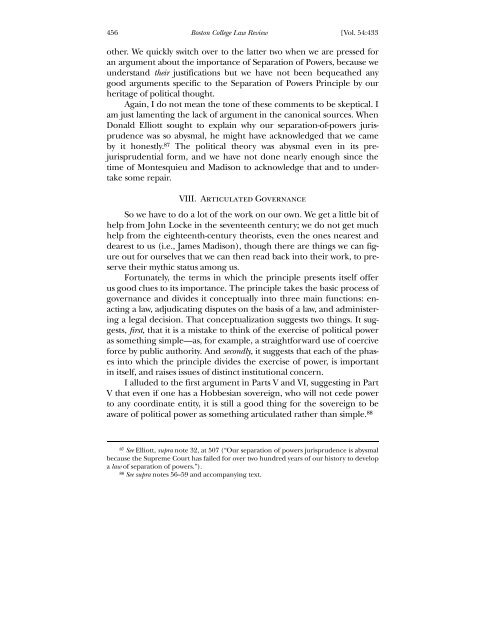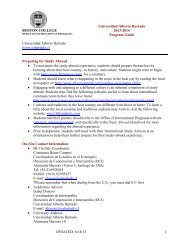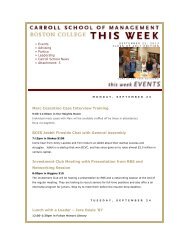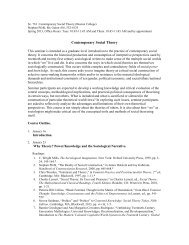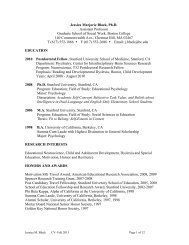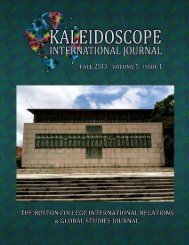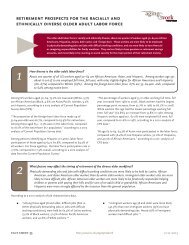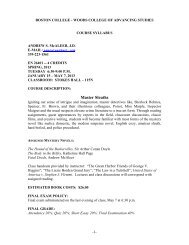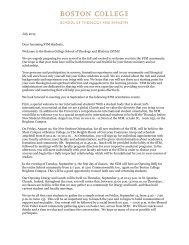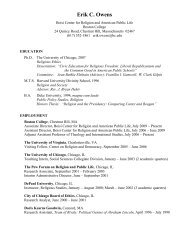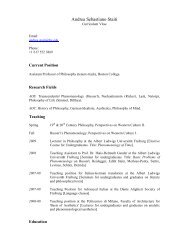separation of powers in thought and practice? - Boston College
separation of powers in thought and practice? - Boston College
separation of powers in thought and practice? - Boston College
You also want an ePaper? Increase the reach of your titles
YUMPU automatically turns print PDFs into web optimized ePapers that Google loves.
456 <strong>Boston</strong> <strong>College</strong> Law Review [Vol. 54:433<br />
other. We quickly switch over to the latter two when we are pressed for<br />
an argument about the importance <strong>of</strong> Separation <strong>of</strong> Powers, because we<br />
underst<strong>and</strong> their justifications but we have not been bequeathed any<br />
good arguments specific to the Separation <strong>of</strong> Powers Pr<strong>in</strong>ciple by our<br />
heritage <strong>of</strong> political <strong>thought</strong>.<br />
Aga<strong>in</strong>, I do not mean the tone <strong>of</strong> these comments to be skeptical. I<br />
am just lament<strong>in</strong>g the lack <strong>of</strong> argument <strong>in</strong> the canonical sources. When<br />
Donald Elliott sought to expla<strong>in</strong> why our <strong>separation</strong>-<strong>of</strong>-<strong>powers</strong> jurisprudence<br />
was so abysmal, he might have acknowledged that we came<br />
by it honestly.87 The political theory was abysmal even <strong>in</strong> its prejurisprudential<br />
form, <strong>and</strong> we have not done nearly enough s<strong>in</strong>ce the<br />
time <strong>of</strong> Montesquieu <strong>and</strong> Madison to acknowledge that <strong>and</strong> to undertake<br />
some repair.<br />
VIII. Articulated Governance<br />
So we have to do a lot <strong>of</strong> the work on our own. We get a little bit <strong>of</strong><br />
help from John Locke <strong>in</strong> the seventeenth century; we do not get much<br />
help from the eighteenth-century theorists, even the ones nearest <strong>and</strong><br />
dearest to us (i.e., James Madison), though there are th<strong>in</strong>gs we can figure<br />
out for ourselves that we can then read back <strong>in</strong>to their work, to preserve<br />
their mythic status among us.<br />
Fortunately, the terms <strong>in</strong> which the pr<strong>in</strong>ciple presents itself <strong>of</strong>fer<br />
us good clues to its importance. The pr<strong>in</strong>ciple takes the basic process <strong>of</strong><br />
governance <strong>and</strong> divides it conceptually <strong>in</strong>to three ma<strong>in</strong> functions: enact<strong>in</strong>g<br />
a law, adjudicat<strong>in</strong>g disputes on the basis <strong>of</strong> a law, <strong>and</strong> adm<strong>in</strong>ister<strong>in</strong>g<br />
a legal decision. That conceptualization suggests two th<strong>in</strong>gs. It suggests,<br />
first, that it is a mistake to th<strong>in</strong>k <strong>of</strong> the exercise <strong>of</strong> political power<br />
as someth<strong>in</strong>g simple—as, for example, a straightforward use <strong>of</strong> coercive<br />
force by public authority. And secondly, it suggests that each <strong>of</strong> the phases<br />
<strong>in</strong>to which the pr<strong>in</strong>ciple divides the exercise <strong>of</strong> power, is important<br />
<strong>in</strong> itself, <strong>and</strong> raises issues <strong>of</strong> dist<strong>in</strong>ct <strong>in</strong>stitutional concern.<br />
I alluded to the first argument <strong>in</strong> Parts V <strong>and</strong> VI, suggest<strong>in</strong>g <strong>in</strong> Part<br />
V that even if one has a Hobbesian sovereign, who will not cede power<br />
to any coord<strong>in</strong>ate entity, it is still a good th<strong>in</strong>g for the sovereign to be<br />
aware <strong>of</strong> political power as someth<strong>in</strong>g articulated rather than simple.88<br />
87 See Elliott, supra note 32, at 507 (“Our <strong>separation</strong> <strong>of</strong> <strong>powers</strong> jurisprudence is abysmal<br />
because the Supreme Court has failed for over two hundred years <strong>of</strong> our history to develop<br />
a law <strong>of</strong> <strong>separation</strong> <strong>of</strong> <strong>powers</strong>.”).<br />
88 See supra notes 56–59 <strong>and</strong> accompany<strong>in</strong>g text.


